
 |
ENGINEERED
STEEL PRODUCTS |
| Priced
Full Line Products Catalog |
20
Technology Way • West Greenwich, RI 02817
Toll free:(800) 421-0314 • In RI:(401) 272-4570 • Fax:(401)
421-5679 |
 |
|
|
 |
Back
to Product Category
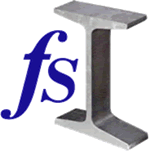 |
|
ALUMINUM ALTERNATING
TREAD STAIR
|
|
|
|
68º
Steep Incline Stair - Walk Up and Down Facing Forward
Smallest Footprint of Any Stair Design! |
|
|
|
|
|
|
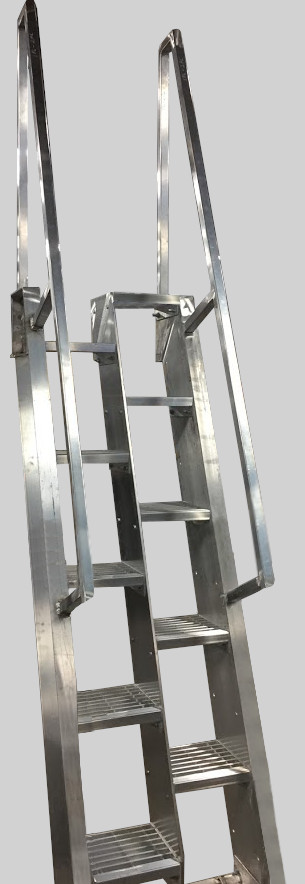 |
|
|
|
|
Acceptable
Usage: For
industrial/commercial maintenance access
and industrial/commercial storage access. This is a steep incline
stair not acceptable for public access, office use, or residential applications.
Suitable in areas where standard stairs are not feasible. |
|
|
|
|
|
Safe
Access With Minimum Space Requirement |
|
|
|
|
|
•
Quality engineered to your specific height requirement at a
nominal 68º angle of rise.
• Designed for safety and convenience.
• Heavy duty aluminum I Bar grating stair treads won't sag or dish
(supplied as standard).
• Factory welded handrails of 1-1/2" x .125 aluminum (6063-T52)
square tubing.
• 10" x 2.6" aluminum (6061-T6511) structural channel stringers.
• Fire proof construction.
• Meets International Building code standards and OSHA
Standard 1910.25 (see below price table).
• Standard 11" wide treads, 27.5" overall stair width. Other
widths available upon request.
• Finish is mill finish aluminum.
• Tread depth is 9-13/16" I Bar grating treads.
• Stainless Steel assembly hardware included.
• 50º - 70º special inclines available upon
request. |
|
|
|
|
|
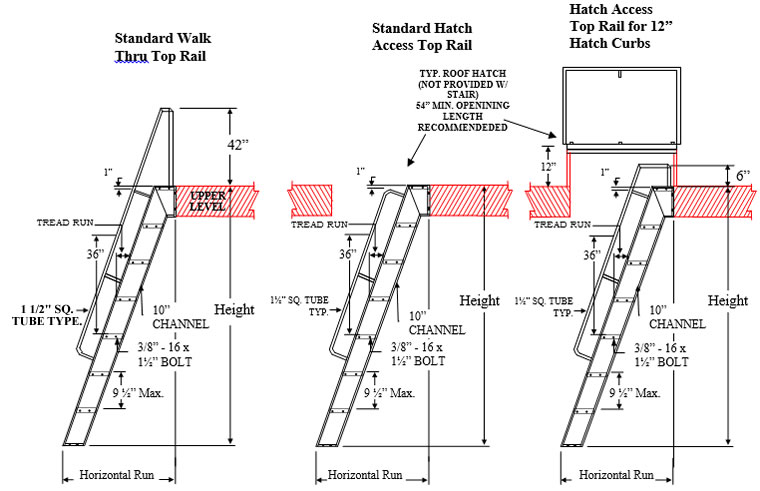 |
|
|
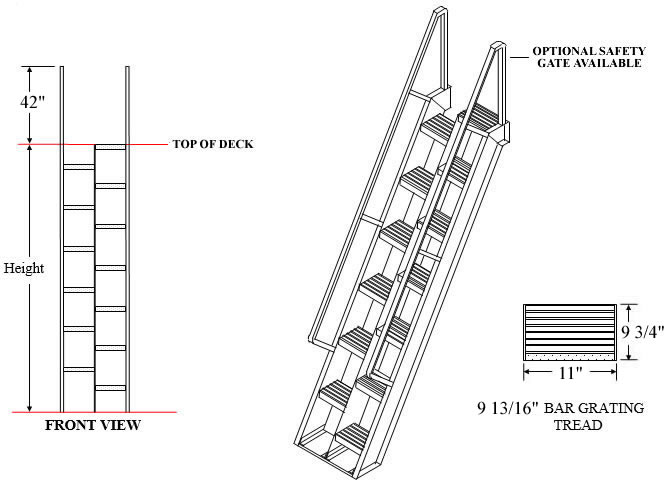 |
|
|
|
 |
|
|
|
|
|
|
|
|
|
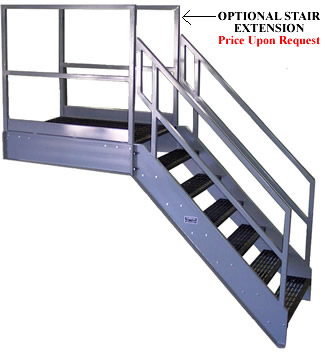 |
|
|
|
|
|
|
|
OSHA
stair shown with optional
horizontal extension. |
|
|
|
|
|
|
|
|
|
|
|
|
|
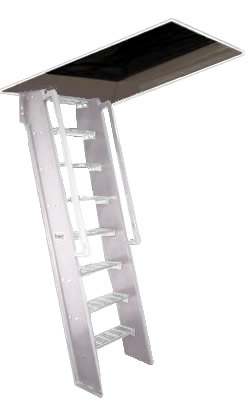 |
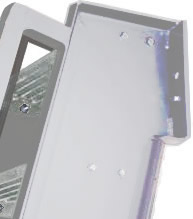 |
|
|
|
|
|
|
|
 |
|
I
Bar Aluminum Treads |
|
|
|
|
|
|
|
|
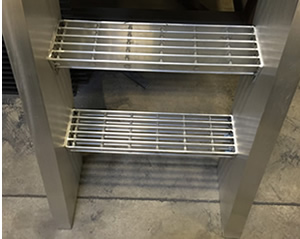 |
|
|
|
|
|
|
|
Welded
Top Mounting
Plates With Lag Holes |
|
|
|
|
|
|
|
|
|
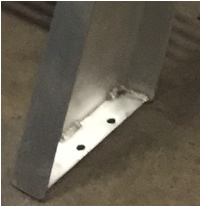 |
|
|
|
|
|
|
|
|
|
Flush
Top Treads |
|
|
|
|
|
|
|
|
|
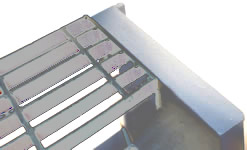 |
|
|
|
|
|
|
International
Building Code
And OSHA CONFORMANCE
See Details Below Price Tables |
|
|
|
|
|
|
|
|
Welded
Footplate
with Lag Holes |
|
|
|
|
|
|
|
|
|
|
|
|
|
|
Close-up
of Flush Top Tread |
|
|
|
|
|
|
|
|
|
|
|
|
|
|
|
|
|
Custom
Sizes - Same Day Quotes |
Custom
sizes and configurations are readily available. We provide same day price
quotes if you require a special stair
angle, specific tread rise/run, or a maximum horizontal stair run to satisfy
available floor space constraints. |
|
|
 |
|
Order
Online, by Phone, or by E-Mail |
|
|
|
~ Add
items to your online shopping cart ~
Click a Model No. of the item you wish to
purchase. |
|
|
Aluminum
Alternating Tread Stairs Prices |
Model No. |
(A) Height Range |
(B) Horizontal
Run @ 68º |
Tread
Width |
Nominal
Overall Width |
Price with I Bar
Grating Treads |
Lower |
Upper |
|
36" |
41" |
24
5/16 - 26 5/16 |
11" |
27.5" |
$3,166 |
|
42" |
47" |
26
3/4 - 28 3/4 |
11" |
27.5" |
$3,340 |
|
48" |
53" |
29
3/16 - 31 3/16 |
11" |
27.5" |
$3,514 |
|
54" |
59" |
31
9/16 - 33 5/8 |
11" |
27.5" |
$3,688 |
|
60" |
65" |
34
- 36 1/16 |
11" |
27.5" |
$3,861 |
|
66" |
71" |
36
7/16 - 38 7/16 |
11" |
27.5" |
$4,035 |
|
72" |
77" |
38
7/8 - 40 7/8 |
11" |
27.5" |
$4,209 |
|
78" |
83" |
41
5/16 - 43 5/16 |
11" |
27.5" |
$4,383 |
|
84" |
89" |
43
11/16 - 45 3/4 |
11" |
27.5" |
$4,557 |
|
90" |
95" |
46
1/8 - 48 3/16 |
11" |
27.5" |
$4,731 |
|
96" |
101" |
48
9/16 - 50 9/16 |
11" |
27.5" |
$4,966 |
|
102" |
107" |
51
- 53 |
11" |
27.5" |
$5,143 |
|
108" |
113" |
53
7/16 - 55 7/16 |
11" |
27.5" |
$5,354 |
|
114" |
119" |
55
13/16 - 57 7/8 |
11" |
27.5" |
$5,531 |
|
120" |
125" |
58
1/4 - 60 1/4 |
11" |
27.5" |
$5,708 |
|
126" |
131" |
60
11/16 - 62 11/16 |
11" |
27.5" |
$5,886 |
|
132" |
137" |
63
1/8 - 65 1/8 |
11" |
27.5" |
$6,063 |
|
138" |
143" |
65
1/2 - 67 9/16 |
11" |
27.5" |
$6,240 |
|
144" |
149" |
67
15/16 - 70 |
11" |
27.5" |
$6,417 |
|
150" |
155" |
70
3/8 - 72 3/8 |
11" |
27.5" |
$6,595 |
|
156" |
161" |
72
13/16 - 74 13/16 |
11" |
27.5" |
$6,772 |
|
162" |
167" |
75
1/4 - 77 1/4 |
11" |
27.5" |
$6,949 |
|
168" |
173" |
77
5/8 - 79 11/16 |
11" |
27.5" |
$7,126 |
|
174" |
179" |
80
1/16 - 82 1/8 |
11" |
27.5" |
$7,304 |
|
180" |
185" |
82
1/2 - 84 1/2 |
11" |
27.5" |
$7,481 |
|
186" |
191" |
84
15/16 - 86 15/16 |
11" |
27.5" |
$7,658 |
|
|
|
 |
|
Order
Online, by Phone, or by E-mail |
|
|
|
~ Add
items to your online shopping cart ~
Click a Model No. of the item you wish to
purchase. |
|
|
Optional
Safety Gate |
|
|
|
|
|
|
|
|
|
|
 |
|
|
|
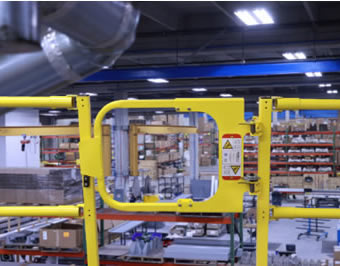 |
|
|
|
|
|
|
|
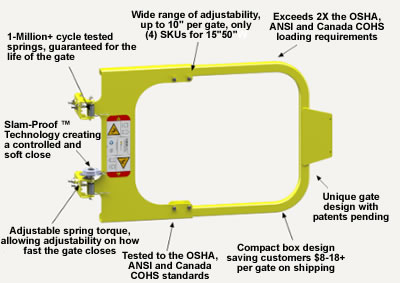 |
|
|
|
|
|
|
|
|
Available
Finishes:
Aluminum (ALU) |
|
|
|
|
|
|
|
|
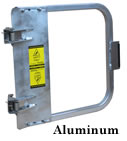 |
|
|
|
|
|
|
|
|
|
|
|
|
|
|
|
|
|
|
|
|
|
|
|
Model
No. |
Min |
Max |
Weight
| Price |
|
19-3/4" |
23-1/2" |
21
lbs |
$608 |
|
|
|
INTERNATIONAL
BUILDING CODE STANDARDS |
|
|
|
| 1011.14
Alternating tread devices. |
1011.14.2
Treads of alternating tread devices. |
Alternating
tread devices are limited to an element of a
means of egress in buildings of Groups F, H and S
from a mezzanine not more than 250 square feet (23 m²)
in area and that serves not more than five occupants; in
buildings of Group I-3 from a guard tower, observation
station or control room not more than 250 square feet
(23 m²) in area and for access to unoccupied roofs.
Alternating tread devices used as a means of egress
shall not have a rise greater than 20 feet (6096 mm)
between floor levels or landings. |
Alternating
tread devices shall have a minimum tread
depth of 5 inches (127 mm), a minimum projected
tread depth of 8 1/2 inches (216 mm), a minimum
tread width of 7 inches (178 mm) and a maximum
riser height of 9 1/2 inches (241 mm). The tread
depth shall be measured horizontally between the
vertical planes of the foremost projections of adjacent
treads. The riser height shall be measured vertically
between the leading edges of adjacent treads. The riser
height and tread depth provided shall result in an angle
of ascent from the horizontal of between 50 and 70
degrees (0.87 and 1.22 rad). The initial tread of the
device shall begin at the same elevation as the platform,
landing or floor surface. |
|
| 1011.14.1
Handrails of alternating tread devices. |
Handrails
shall be provided on both sides of alternating
tread devices and shall comply with Section 1014. |
|
|
|
|
|
|
Exception: Alternating tread devices used a an
element of a means of egress in buildings from a
mezzanine area not more than 250 square feet (23m²)
in area that serves not more than five occupants shall
have a minimum tread depth of 3 inches (76 mm) with
a minimum projected tread depth of 10 1/2 inches
(267 mm). The rise to the next alternating tread surface
shall not exceed 8 inches (203 mm). |
|
OSHA
Standard 1910.25 Stairways |
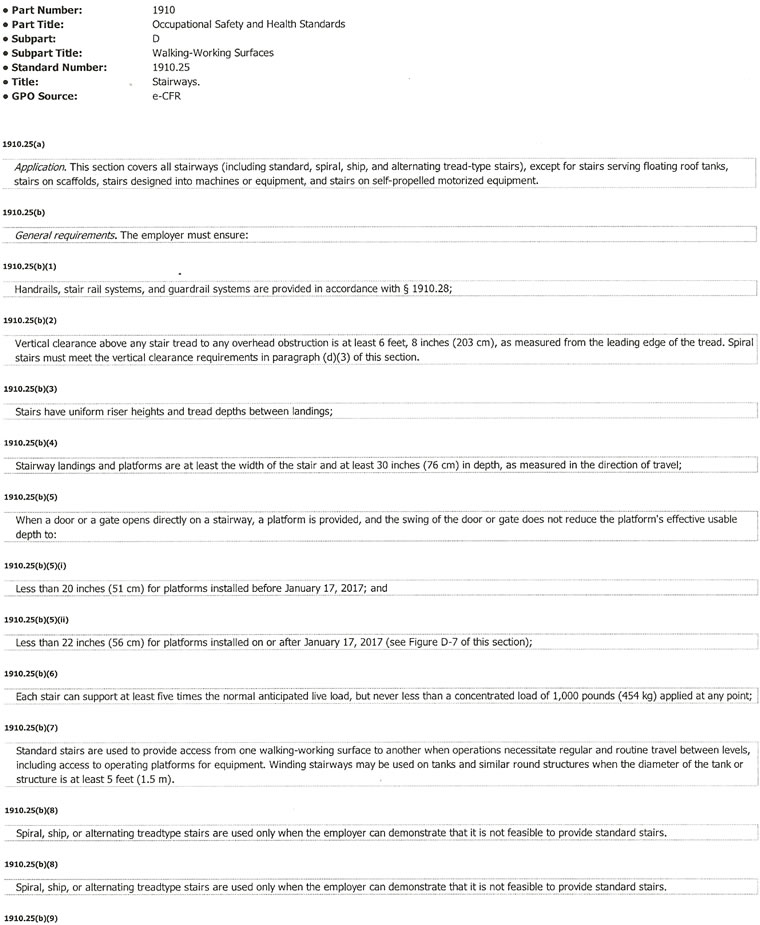 > > |
|
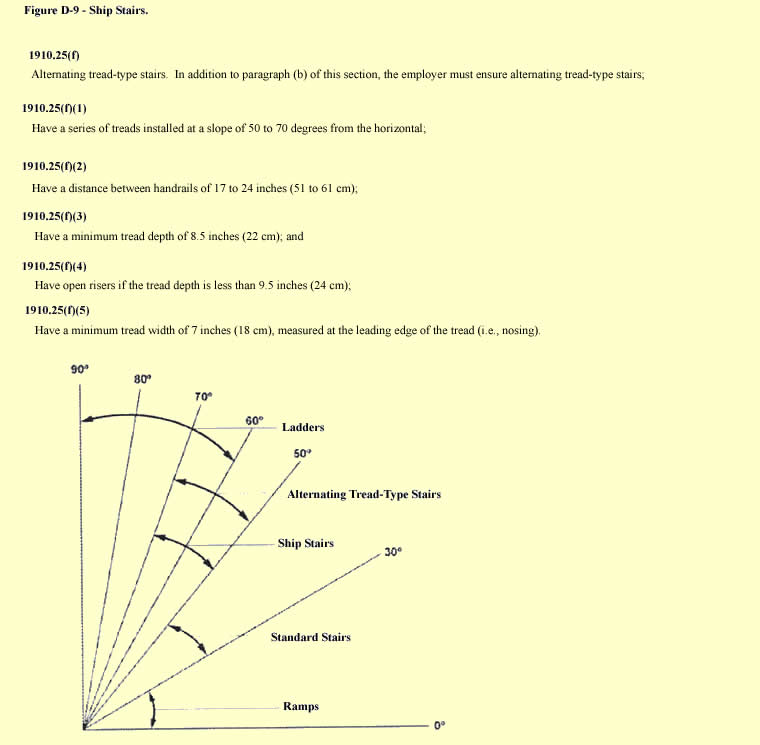 |
|
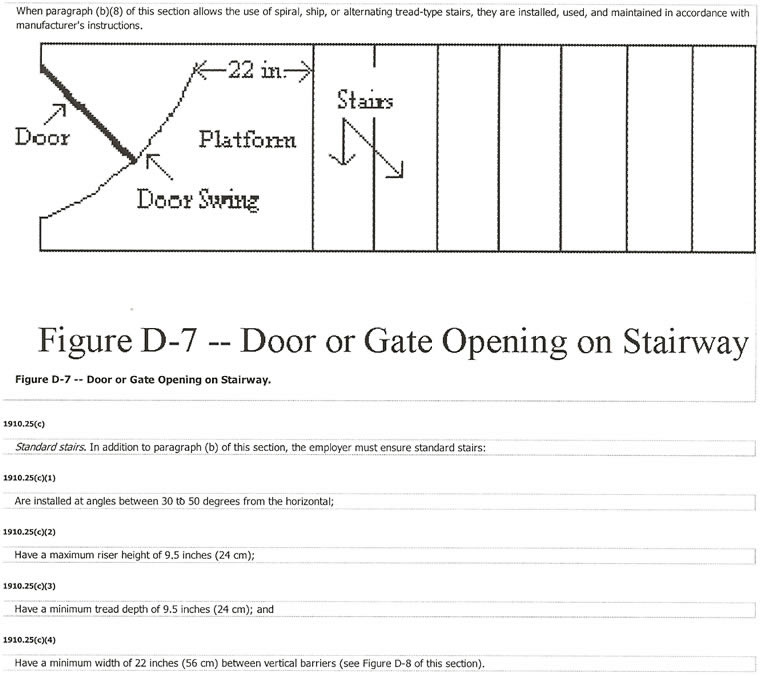 |
|
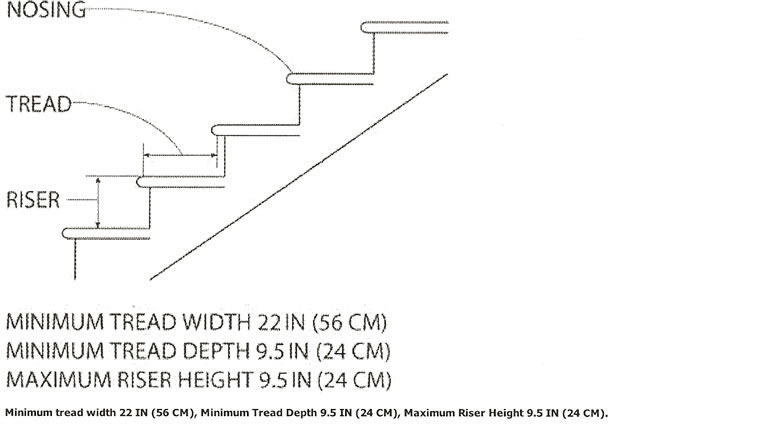 |
 |
|
Walking-Working
Surfaces and Personal Fall Protection Systems Final Rule
Frequently Asked Questions |
The intent
of OSHA’s Walking-Working Surfaces standard, 29 CFR Part 1910, Subpart
D & I, is to increase the
protection of general industry employees and employers from hazards associated
with walking-working surfaces. The
rule making will significantly reduce the number of worker deaths and injuries
that occur each year resulting from
workplace slip, trip, and fall hazards. The final rule was published on
November 18, 2016, and became effective on
January 17, 2017. Some requirements in the final rule have compliance dates
after the effective date and will be
discussed in further detail below. This final rule and the associated preamble,
providing more detailed explanation of
the rule, is available on the Federal Register website at 81 FR 82494, Walking-Working
Surfaces; Personal Protective
Equipment; Final Rule, November 18, 2016.
OSHA requirements are set by statute, standards, and regulations. The Agency’s
interpretations explain these
requirements and how they apply to particular circumstances, but they do
not create additional employer obligations.
Note that our enforcement guidance may be affected by legislative or rule
making changes to OSHA requirements.
Also, from time to time we update our guidance in response to new information.
To keep apprised of such
developments, you can consult OSHA’s website at http://www.osha.gov.
This webpage provides guidance, in a question and answer format, regarding
OSHA’s Final Rule, Walking-Working
Surfaces and Personal Protective Equipment, 29 CFR Part 1910, Subpart D
and I. These Frequently Asked Questions
(FAQs) are divided into five sections: general questions, rope descent system
(RDS) questions, outdoor advertising
questions, residential roof questions, and agricultural operation questions. |
|
| Standard
Stairs |
Does
the exception to the 9.5-inch riser height and 9.5-inch tread depth requirements
for stairs installed before
January 17, 2017 (§19210.25(c)(5)), also apply to stairs designed and
fabricated, but not yet installed, by that date? |
Stairs
with design drawings issued for construction or that were in fabrication
before January 17, 2017, but not
installed, will be in compliance if they met the previous requirements for
standard stairs. |
|
Under
the previous standard, stairs with a handrail that doubles as a stair rail
could have a rail height of 30 to 34
inches. If an employer's stairs were installed prior to January 17, 2017,
must the rails have a minimum height of
36 inches if the stair rail doubles as a handrail? |
The final
rule does not affect stair rail systems and handrails installed before January
17, 2017 that were in
compliance with the requirements in the old standard. |
|
Does
the requirement that standard stairs have a slope between 30 to 50 degrees
apply to stairs installed after January
7, 2017. Therefore, the maximum angle for standard stairs is 45 degrees. |
Yes. The
final rule limits the maximum rise height and minimum tread depth to 9.5
inches for standard stairs installed
after January 17, 2017. Therefore, the maximum angle for standard stairs
is 45 degrees. |
|
| Are
stairs installed after January 17, 2017, that have an angle of 50 degrees
considered to be ships stairs? |
The final
rule defines ship stairs as "a stairway that is equipped with treads,
stair rails, and open risers, and has a slope
of 50 to 70 degrees." Ship stairs must also comply with §1910.25(b)
and (e), such as a minimum tread depth of 4
inches, a minimum tread width of 18 inches, and a vertical clearance above
any stair tread to any overhead
obstruction of at least 6 feet 8 inches. |
|
What
if the doorway described in §1910.25(b)(5)(ii) and shown in figure
D-7 is perpendicular to the direction of
travel and opens onto the landing? Does the same dimension apply to this
condition? |
Yes.
As figure D-7 illustrates, Section 1910.25(b)(5) requires that a platform
be provided when a door or a gate opens
directly onto a stairway. For platforms installed after January 17, 2017,
the final rule also requires that employers
ensure the swing of the door or gate does not reduce the "effective
usable depth" of the platform to less than 22 inches (§1910.25(b)(5)(ii)).
The preamble to the final rule describes "effective usable depth"
as the portion of the platform
beyond the swing of the door where a worker can stand when opening the door
(82 FR 82557). The provision applies
equally to stairway doors that are perpendicular to the direction of travel. |
|
Are
fixed stairs attached to the exterior of tanks required to comply with the
requirements of §1910.25(b) or would
those stairs fall under the exemptions in §1910.25(a)?
The exception from the stair requirements in §1910.25(a) only applies
to stairs serving floating roof tanks, stairs on
scaffolds, stairs on self-propelled motorized equipment, or stairs designed
into machines or equipment. For stairs on
the exterior of other tanks, employers would have to ensure they comply
with the requirements in §1910.25(b) and (c). |
|
Would
winding stairs attached to tanks be required to meet the requirements in
§1910.25(d) for spiral stairs?
No. Section 1910.21(b) defines spiral stairs as a "series of treads
attached to a vertical pole in a winding fashion,
usually within a cylindrical space" (emphasis added). Winding stairs
attached to tanks do not have vertical poles;
therefore, they are not spiral stairs and must meet the requirements of
§1910.25(b) and (c). |
|
Based
on the height requirements for stair rails and handrails and the requirements
in Table D-2, are both stair rails
and handrails required on stairs that have two open sides and are less than
44-in. wide?
Yes. Section 1910.28(b)(11)(ii) Table D-2 contains a printing error, which
OSHA will correct in a published notice.
For each flight of stairs with two open sides and a width of less than 44
inches, column 4 of Table D-2 should state
"One stair rail system with hand rail on each open side" is required.
(See 81 FR 82611-12). |
|
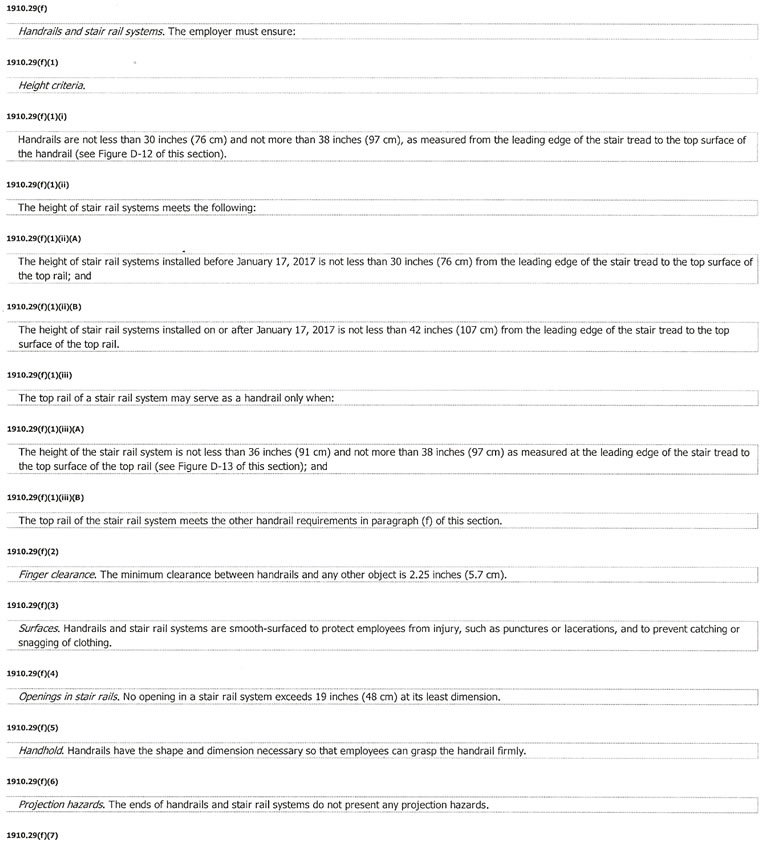 |
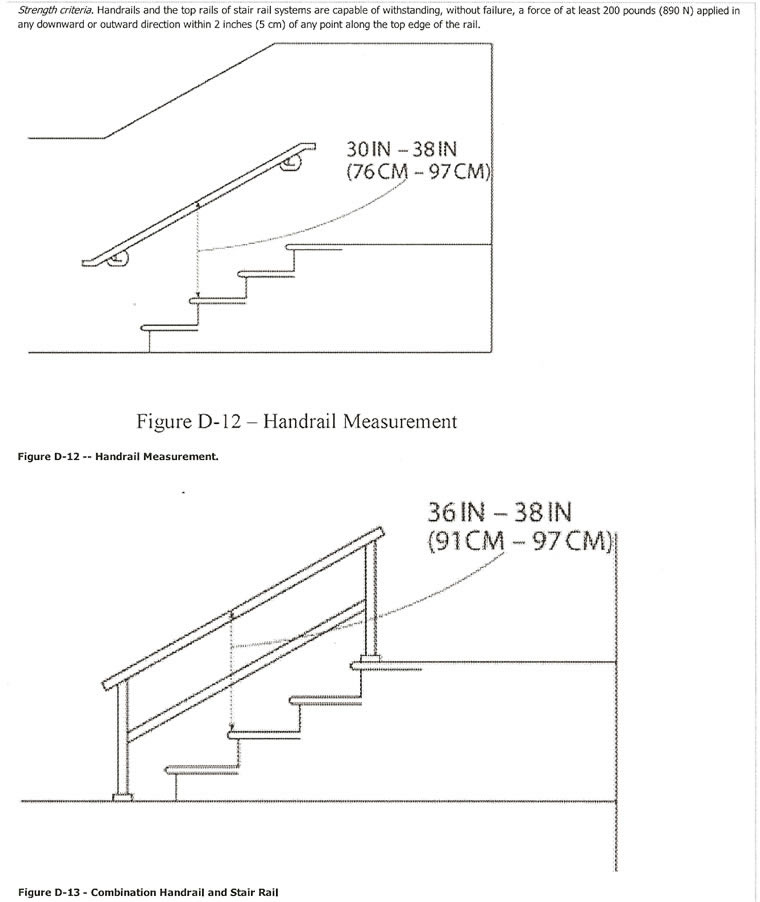 |
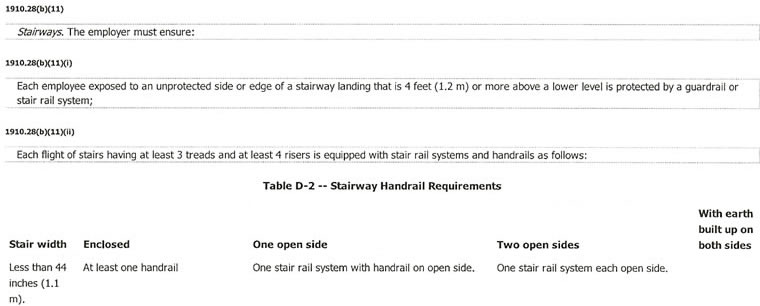 |
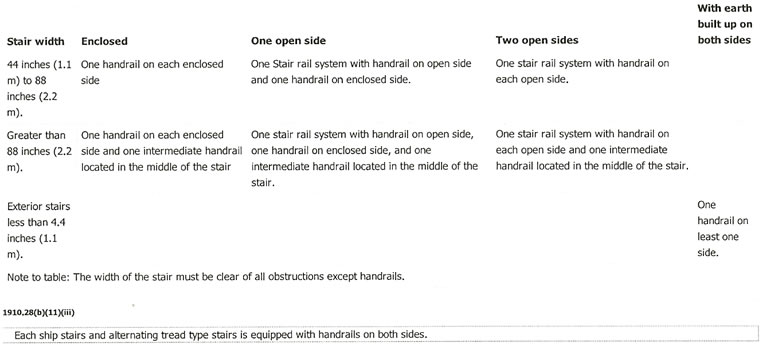 |
|
Aluminum Alternating Tread
Stairs, Industrial Stairs, Metal Stairs, Plate Tread Stair, Steep Incline
Stairs, Outdoor
Aluminum Stairs, Prefab Metal Stairs, Prefab Aluminum Stairs, Prefabricated
Stair, Stair Manufacturers, Aluminum Pan
Stairs, Aluminum Stairs |
Back
to Product Category |
 |
|


















 >
>






